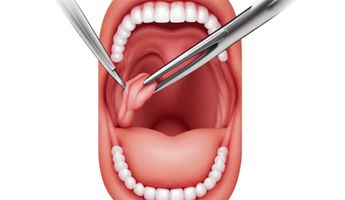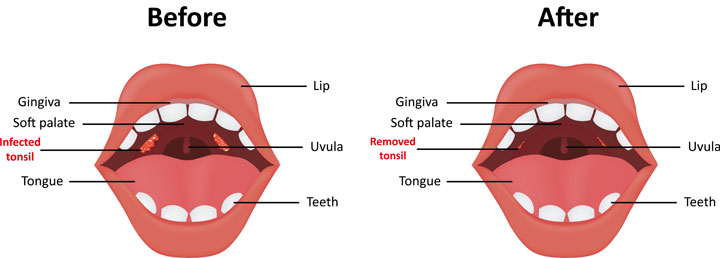Tonsillectomy in Switzerland
Search and Compare the Best Clinics and Doctors at the Lowest Prices for Tonsillectomy in Switzerland

Find the best clinics for Tonsillectomy in Switzerland
No pricing info available
Morocco offers the best prices Worldwide
Price: $ 308
Klinik Hirslanden, located in Witellikerstrasse, Zurich, Switzerland offers patients Tonsillectomy procedures among its total of 530 available procedures, across 28 different specialties. Currently, there's no pricing information for Tonsillectomy procedures at Klinik Hirslanden, as all prices are available on request only. All procedures and treatments are undertaken by the lead specialist at the Clinic, and they are not accredited by any recognized accreditations institutes
- Home
- Switzerland
WHY US?
At Medijump, we're making medical easy. You can search, compare, discuss, and book your medical all in one place. We open the door to the best medical providers worldwide, saving you time and energy along the way, and it's all for FREE, no hidden fees, and no price markups guaranteed. So what are you waiting for?

Free

Best Price

Widest Selection

Risk-Free
What you need to know about Tonsillectomy in Switzerland

Tonsillectomy is a surgical procedure to remove the tonsils – the two oval-shaped pads of tissue located at the back of the throat. The procedure is usually performed to treat recurring or chronic inflammation and infection of the tonsils (known as tonsillitis), but it can also be done to treat breathing problems related to swollen tonsils, sleep apnea, cancer of the tonsils, bleeding of the tonsils, as well as frequent and loud snoring.
What does a Tonsillectomy Procedure Involve?
Tonsillectomy is performed under general anesthetic, so you will not feel any pain during the surgery. There are two ways to perform a tonsillectomy. The most common way is to use a blade or scalpel to cut out the tonsils. The other way is to use a specialized surgical tool that uses soundwaves, or high-powered energy heat to destroy or remove the tissues and stop any bleeding.
How Long Should I Stay in Switzerland for a Tonsillectomy Procedure?
Unless there is a complication that occurs after the surgery, you should be able to leave the hospital on the same day. However, plan to stay in Switzerland for about 5 to 10 days for initial recovery and follow-up hospital checkups as your surgeon will monitor the healing progress.
What's the Recovery Time for Tonsillectomy Procedures in Switzerland?
The total recovery period can take about two weeks, but most people are able to go back to work or school and resume most of their normal routine within 5-7 days. Avoid any strenuous activities, such as intense exercise and heavy lifting for a few weeks following the surgery to avoid any complications. Your surgeon will give you a detailed recovery timeline for you.
What sort of Aftercare is Required for Tonsillectomy Procedures in Switzerland?
Make sure to take pain medications as prescribed by your surgeon and drink plenty of water to avoid dehydration. You may need to avoid hard, crunchy, acidic, or spicy foods for a while, and your surgeon may give you a dietary plan. Talk to your surgeon about any activities that you need to avoid to prevent tonsillitis from recurring.
What's the Success Rate of Tonsillectomy Procedures in Switzerland?
Tonsillectomy is generally safe and highly successful. The morbidity rates of the procedure range from 1.5% to 1.4%. However, like other types of surgeries, there are side effects and risks that you should not overlook, including swelling, bleeding during healing, bleeding during surgery, reactions to anesthetics, infection, and sore throat.
Are there Alternatives to Tonsillectomy Procedures in Switzerland?
In some cases, tonsillitis that is not severe and only happened once does not need a tonsillectomy. For other conditions, your alternative depends on the disease you used the procedure for. For instance, if you have sleep apnea, your doctor may suggest you undergo nasal surgery, tongue surgery, or bone surgery. If you need to undergo the procedure because of cancer, your doctor may recommend chemotherapy, immunotherapy, and radiation therapy.
What Should You Expect Before and After the Procedure
Having a problem in your tonsils can be uncomfortable, causes painful symptoms, and it can also lead to other dangerous complications. After the procedure, all of your symptoms should be relieved and your risk of dangerous complications is significantly reduced.
Whilst the information presented here has been accurately sourced and verified by a medical professional for its accuracy, it is still advised to consult with your doctor before pursuing a medical treatment at one of the listed medical providers
No Time?
Tell us what you're looking for and we'll reachout to the top clinics all at once
Enquire Now

Popular Procedures in Switzerland
Prices Start From $8,031

Prices Start From $404

Prices Start From $18

Recommended Medical Centers in Switzerland for Tonsillectomy

- Interpreter services
- Translation service
- Religious facilities
- Medical records transfer
- Medical travel insurance
- Health insurance coordination
- TV in the room
- Safe in the room
- Phone in the room
- Private rooms for patients available

- Interpreter services
- Translation service
- Religious facilities
- Medical records transfer
- Medical travel insurance
- Health insurance coordination
- TV in the room
- Safe in the room
- Phone in the room
- Private rooms for patients available

- Interpreter services
- Translation service
- Religious facilities
- Medical records transfer
- Medical travel insurance
- Health insurance coordination
- TV in the room
- Safe in the room
- Phone in the room
- Private rooms for patients available

- Interpreter services
- Translation service
- Religious facilities
- Medical records transfer
- Medical travel insurance
- Health insurance coordination
- TV in the room
- Safe in the room
- Phone in the room
- Private rooms for patients available

- Interpreter services
- Translation service
- Religious facilities
- Medical records transfer
- Medical travel insurance
- Health insurance coordination
- TV in the room
- Safe in the room
- Phone in the room
- Private rooms for patients available

- Interpreter services
- Translation service
- Religious facilities
- Medical records transfer
- Medical travel insurance
- Health insurance coordination
- TV in the room
- Safe in the room
- Phone in the room
- Private rooms for patients available
Tonsillectomy in and around Switzerland
About Switzerland
Switzerland is a landlocked country located in Europe and is famous for its chocolate and clocks; this country offers its visitors beautiful landscapes, medieval towns, modern art, avant-garde culture, and Alpine tradition. From the Swiss Alps and the Jura Mountains to Renaissance-era allegorical statues and medieval architecture, Switzerland provides an unforgettable experience for everyone. Today, the country is popular with medical tourists who travel here for top quality elective surgery and dentistry. The healthcare system is world-renowned and beyond impressive, with highly qualified doctors and staff who work in ultra-modern hospitals and clinics. According to the WHO, Switzerland’s public health services system is one of the most effective in the world. A full range of advanced medicine and technology are available here, from heart surgery, orthopedics, neurosurgery, to oncology.
Popular Cities and Regions in Switzerland
Most medical tourists travel to Bern, the de facto capital of Switzerland. Here, tourists can walk around the historic town center that is brimming with churches, cobblestone streets, medieval clock towers, and well-preserved sandstone homes. The main attractions in this city are Zentrum Paul Klee and Kunstmuseum. Besides Bern, Zürich is a famous destination for medical tourists. Set on the beautiful Zurich Lake, this city offers many amazing medical centers and tourist attractions. It’s a culturally vibrant city that is recognized as one of the most liveable cities in the world. Tourists are welcome to visit Fraumüster, explore Schweizerisches Landesmuseum, and admire art at Kunsthaus. Along with Bern and Zürich, Geneva is also popular. It has the world’s largest fountain, a historic city center, and spectacular views of Lake Geneva.
Transport in Switzerland
Zurich Airport is the main gateway to Switzerland. It serves regular scheduled and charter flights to and from numerous cities in Europe, North America, and Asia. Public transport in the country is comprehensive. Trains are comfortable and scenic, and buses take over where the rails run out. Taxis and Uber are available to travel inside cities.
Visas in Switzerland
As a part of the Schengen Agreement, Switzerland allows citizens of 62 countries, including Australia and the US, to stay in the country without a visa for up to 90 days. Nationals of most other countries are required to have a Schengen visa to enter the country.
Weather in Switzerland
Winter (November – March) is cold and snowy, with an average temperature of 5 to 10°C in Zurich. It’s a popular time for tourists who want to ski. Spring (April – June) has warmer weather, although some areas still experience snowfall. Summer (July – August) brings perfect and warm weather, with an average temperature of 27°C. Autumn (September – October) is still warm but the days are becoming shorter.
Additional Info
- Local Currency: The currency is the Swiss Franc (CHF). 1 CHF is equivalent to 1.04 USD.
- Money & Payments: ATMs can be found easily and major credit cards (Visa and MasterCard) are widely accepted. Tipping is not necessary.
- Local Language: Switzerland has four official languages: German, French, Italian, and Romansh. Most of the population speaks excellent English, especially those in major cities.
- Local Culture and Religion: The predominant religion is Christianity, which has been present in the country since the Roman Era. The country guarantees full freedom of religion, and Islam, Hinduism, Buddhism, Judaism, as well as other religions are practiced by a small portion of the population.
- Public Holidays: Switzerland has several public holidays, including New Year’s Day, Berchtold's Day, Corpus Christi, Immaculate Conception Day, and Christmas Day.
Popular Searches
- Plastic Surgery in Thailand
- Dental Implants in Thailand
- Hair Transplant in Thailand
- Breast Augmentation Thailand
- Gastric Sleeve in Thailand
- Gender Reassignment Surgery in Thailand
- Laser Hair Removal in Bangkok
- Botox in Bangkok
- Dermatology in Bangkok
- Breast Augmentation in Bangkok
- Coolsculpting in Bangkok
- Veneers in Turkey
- Hair Transplant in Turkey
- Rhinoplasty in Turkey
- Stem Cell Therapy in Mexico
- Rhinoplasty in Mexico
- Liposuction in Mexico
- Coolsculpting in Tijuana
- Rhinoplasty in Korea
- Scar Removal in Korea
- Gastric Sleeve in Turkey
- Bone Marrow Transplant in India
- Invisalign in Malaysia
- Plastic Surgery in the Dominican Republic
- Tummy Tuck in the Dominican Republic
- Plastic and Cosmetic Surgery in Poland
- Rhinoplasty in Poland
- Hair Implant in Poland
- Dental Implants in Poland
- IVF in Turkey
